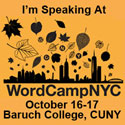Tue 13 Apr 2010
Google and Google Apps
Posted by Joseph Ugoretz under Email, Happenings
[2] Comments
I just returned from a visit to the famed Googleplex for the Google Apps for Education Summit. Aside from the fun of seeing the Google “campus” (and that’s a fitting term) from the inside, which felt a little like getting the Golden Ticket from Willie Wonka, I learned quite a bit about where Google Apps for Education is going to be heading, and quite a bit more about what we (at Macaulay) can be (and I think will be) doing with it.
We first made the move of our alumni email accounts to Google last year. At the time, the alumni were stuck on an aging, moribund, Lotus Notes server, and the email was slow, unreliable, often clogged with spam, constantly in need of restarts. Things totally changed for them with the move to gmail. The new Google email experience for alumni (and a small pilot group of students) was nothing short of terrific. The new email system gave them huge storage, complete reliability, and an interface (Gmail, everyone knows it!) they already knew and valued. Given a choice (and we did some extensive focus groups with students), they preferred gmail not just to their Lotus Notes email (no surprise there), but also to the Microsoft offering we were also considering.
And the transfer was accomplished (over the summer–maybe not the best time!) with very minimal pain. Google technicians were completely helpful with that. But it didn’t take much help. The system is simple to administer and simple to use.
It’s now been almost a full academic year, and for email, I really couldn’t ask for better. The many complaints that students had about the old systems, both Lotus and Microsoft, have ceased. Usage is not particularly heavy (this is pretty much what I hear from IT folks in all of higher ed. Students don’t use their official email, and maybe not any email, very much or very often. They definitely want to have it, and when they do use it it’s important to them, but on a day-to-day basis it’s not the most important communication tool in their arsenal).
So now I’m looking ahead. And I’m looking beyond just gmail. The real power of Google Apps for Education is in the apps–not the email. This is where I want to take us. Google Docs, Google Sites, Google Calendar, Google Groups–these are actually extremely powerful communication and collaboration tools. And they’re all part of the package, all included, and to some extent already familiar to students. As we start to plan for the fall’s class of incoming freshmen, I want to start thinking about how we can use these apps within the specific context of Macaulay’s consortial model. Sites for building webpages collaboratively. Docs for student assignments and projects. Groups for student clubs and other kinds of multi-person communication, with Calendar for their planning. The examples that I saw from other campuses across the country were fascinating and inspiring.
None of these ideas would make me abandon our commitment to open source tools and applications–when those are the right tools for the job (which is frequently). The Google apps are going to be right for some purposes and not for others. But there’s also a lot to be said for meeting students where they are, for using the default tools that are the most transparent to students and require the least investment of diminishing college resources.
And there’s more than that. One of the biggest takeaways I had after the visit to Google was that the Project Managers for these apps have a real and sincere commitment–not just to making the best products for their corporation–but to really serving as an example and a model and a spur and an incentive for innovation and progress. They spoke at length and very persuasively about their commitment to keeping these apps accessible and available across platforms. They’re not looking to make things that only work in Chrome, for example, or only on Android. If it doesn’t work well for everyone, they don’t want to make it.
I know, it’s easy for people to say that, and easy for a corporation to co-opt that kind of energy. But I sat there and listened to and talked to those Project Managers. I can judge sincerity, and these people were listening and understanding and thinking (you could see the excitement about new ideas). And what they were thinking about was making things that would help students collaborate, communicate, and create. That’s what we all think about, and I felt very strongly that they were on the same page with that. So I think we’ll be doing more and more with Google apps (beyond just the email!) and I think we’ll be presenting some great model projects soon.


